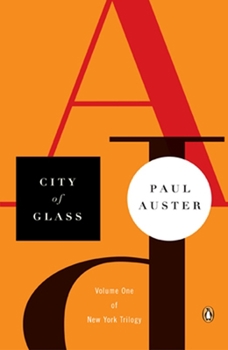Book Overview
EDGAR AWARD NOMINEE - In this stunning debut novel, the first volume in Paul Auster's acclaimed The New York Trilogy, an author determined to solve a mystery begins to descend into madness.
"Remarkable . . . The book is a pleasure to read, full of suspense and action. . . . A] strange and powerful adventure."--The New York Times Book Review After a strange phone call in the middle of the night, Quinn,...
Format:Paperback
Language:English
ISBN:0140097317
ISBN13:9780140097313
Release Date:April 1987
Publisher:Penguin Books
Length:208 Pages
Weight:0.40 lbs.
Dimensions:0.6" x 5.1" x 7.8"
Age Range:18 years and up
Grade Range:Postsecondary and higher
Customer Reviews
5 ratings
You are incorrect sir.
Published by Thriftbooks.com User , 22 years ago
Mesmerizing. Paul Auster throws a tale at me the likes of which I have never seen. This book was given to me by my father, who in turn had been recommended it by a college student studying for his doctorate in english--so basicly it came backed up in force. I had my doubts, especially after glancing over the reviews here---which have since improved a bit--but was astounded upon setting down this book. City of Glass is is for a true literay mind to decipher. If you have at least the slightest interest in either Paradise Lost or Don Quixote this novel is a must. Remember it is a mystery novel, but certainly not the sort I am guessing most are accustomed to=bad reviews. Still I had a blast reading Auster's words, watching him tease me with a few literary techniques I have not ever seen, and doing this in a straight-forward manner. This mystery novel is for the literary sleuth--less the the mystery one. Entertaining.
It's the Process, Not the Ending
Published by Thriftbooks.com User , 24 years ago
From the first page, you're just sucked into the world of the main character, the detective Quinn. One of the best American writer today, Paul Auster's works are mainly based on his real life's experience. That is why his characters are so real. I disagree with the reader who said that his endings tend to be weak. It is very clear that Auster intended to avoid any closure in the endings of his stories. If you've read his other books, you'll realise that most of the time, his characters would just disappear or go on to lead another life, just like the character in Knut Hamsun's Hunger, who just decided to leave on a ship at the end of the novel without giving us any reason.
I stayed up all night reading this artfully written book.
Published by Thriftbooks.com User , 26 years ago
This book makes you think, but it is so skillfully and beautifully written that it is without pretention. It asks questions about writing and literature and art and life, but it is above all a page-turning mystery set in New York City. I always wanted to know what would happen next, but the language was so beautiful that I was content no matter how much or how little of the actions were actually explained. I recommend this to all mystery-lovers, all New Yorkers, and anyone who loves to read. This book may turn you into a bit of an existentialist, but it will do so with a great sense of humor.
Artistic integrity takes dedication.
Published by Thriftbooks.com User , 26 years ago
This book is not as well written as other Auster books I've read, but it's message is powerful nonetheless. "Paul Auster" actually appears in this book as a charachter who sometimes pays attention to his higher self. Consequently "Auster" is able to write a few decent books and essays. One level down from Auster is the detective, capable of better work, who for years has only written mystery books, as an expediency. But what happens if one is distracted (by any chance of life) from achieving even that lowly level of artistic integrity? In such a case the artist invoves himself in meaningless pursuit of his own invention. Unfortunately, that's what most of us do with our lives, perhaps not to the extreme of the detective, but at least to some major extent. This book is about the many possible selves that one could potentially employ, and it is also about the self most of us ultimately tend toward enacting in our life dramas.
author : reader --- criminal : detective
Published by Thriftbooks.com User , 26 years ago
I just did some searching on the 'net after reading City of Glass and found this little gem from some website re: Auster's works:author : reader criminal : detectiveIt's an analogy that seems to hold for all detective stories that I'm accustomed to...except this one. In this one, the author is the criminal is the reader is the detective. So there you have it. Yeah, Auster's pulling triple-duty.I had no idea that Auster was such a literary dude -- this thing is rather deep, lots of specific references (to Don Quixote, John Milton, etc.). Not for the faint-hearted, I'm afraid.The ending left me kinda cold, though. It's a Borges-like ending; in fact, unless my memory fails me (which it does rather frequently nowadays), it's reminiscent of the ending of "The Garden of Forking Paths." Don't expect a knockout punch, for Auster subscribes to T.S. Eliot's "The Hollow Man":This is the way the book ends This is the way the book ends This is the way the book ends Not with a bang but a whimper.Also, Auster is obviously a big Mets fan, which is always a good thing. :)






